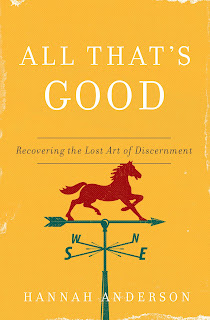From time to time, I write a blog post focusing on a book I've read recently. These aren't reviews - they are a summary of some of my favorite thoughts from the book. The goal of these posts is to help me remember the book better, and hopefully to encourage a few of you to check it out as well. The book I'm writing about today is "All That's Good: Recovering the Lost Art of Discernment" by Hannah Anderson.
This book's main idea is that discernment doesn't just mean avoiding what's bad, but also learning to recognize what's good and beautiful - which can be hard to do in our noisy, chaotic, distraction filled world. Anderson's framework for finding goodness and beauty is Philippians 4:8: "Finally, brothers, whatever is true, whatever is honorable, whatever is just, whatever is pure, whatever is lovely, whatever is commendable, if there is any excellence, if there is anything worthy of praise, think about these things." When we learn to find the things that fit these descriptors (true, honorable, just, pure, lovely, and commendable), we will find what is good and beautiful. The meat of the book goes through each of these characteristics, chapter by chapter, and gives us ideas for how to search these things out.
Here is an example quote from each chapter (these are not intended to summarize the chapter, but just to give you an idea of the type of content):
- True: Here, the idea is that if something is true, it should be able to stand up to questioning and contrary opinions. And if we care about the truth more than being comfortable and right, we should be open to changing our mind if we are proven wrong. P. 75: "We must be willing to test, question, doubt - not the truth, but our own certainty and our own motivations. We must expect and even invite the Scripture and other people to confront and question us. We must allow the truth to make us honest people."
- Honorable: There were two ideas that stuck with me from this chapter -
- First, we need a source of honor that comes from outside other people's approval. P. 85: "when we know that our worth comes from God, it frees us from needing to seek it from other people."
- Second, she urges us to look carefully at who our culture encourages us to honor, and how that matches up with what the Bible says. P. 90: "God regularly upends our cultural notions about who and what deserve honor, choosing instead to destroy the wisdom of the wise. Instead of using the rich, He uses the poor. Instead of celebrating the powerful, He celebrates the weak. And instead of calling those of noble birth, He sends His Son to a manger."
- Just: This chapter talks about how we are bothered when things aren't right because we all carry a sense of goodness; and then it talks about how part of the mess comes from us; and how that points us to our justifier. P. 106: "The problem with seeking justice is how quickly the process reveals our own injustice. We want the world to be the way it should be only to find out that we ourselves are not what we should be...But here too, seeking justice leads to goodness, because when we seek justice, we will find the One who justifies the unjust."
- Pure: This chapter focuses on how purity is having a whole and undivided heart, and that choices made in secret will flow out to our broader character. P. 115: "whether we fulfill our promises to those closest to us predicts whether we will fulfill our promises to the broader community." It also encourages becoming wise about what is good in this arena rather than just trying to avoid what is bad, and teaching kids the same - P. 120: "to be open and honest with the struggles, to celebrate the joy and security of lifelong commitment, to delight in the God-given goodness of our physical bodies."
- Lovely: One part I loved in this chapter is how to treat the loveliness you see in other people. P. 136: "So when we truly see the loveliness of our brothers and sisters, our hearts will respond as it does to any other form of loveliness: in celebration of their Creator - a Creator so wise, so imaginative, so kind as to create each one of us. And when we celebrate their Creator, we will guard the loveliness He has made. We will sacrifice for it, even if it means sacrificing our own desire for it. This is something of what we mean when we talk about not objectifying other people. Their beauty is not ours to possess; it is not ours to consume. It is ours to protect."
- Commendable: This chapter focused on what do we read and what do we talk about, with a special focus on how we interact on the Internet and social media. P. 142: "If we spend our days sharing trivialities, life will be trivial. If we spend our days focused on what we fear, life will be filled with anxiety. If, however, we spend our days talking about good, worthy, glorious things, there is the strong likelihood that our lives will be filled with good, worthy, glorious things."
If this concept and these quotes stir you, I would really encourage you to check out the rest of the book. This is just scratching the surface - I've got stars and underlines all over my book. I absolutely love the idea of seeking out the good and the beautiful in our world, and I think these are some really helpful thoughts about how to do that.
